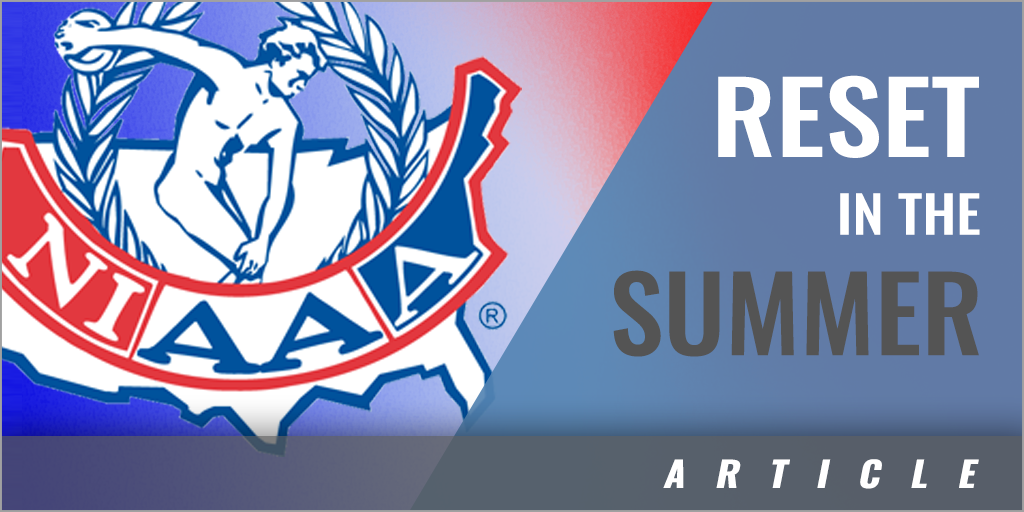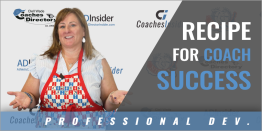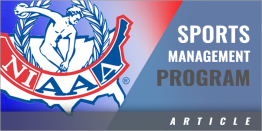|
By: Dr. Mark Rerick, CMAA - University of North Dakota I recently conducted a nationwide athletic director survey aimed at uncovering the stress points of the profession as well as the desired support needed to improve the high anxiety environment of athletic administration. Although I have yet to have the opportunity to start digging into the results of the 1,100+ responses, two data points caught my eye the first time I scrolled through the results. The relationship of these two data points perfectly describes the nature of athletic administration. Response 1: Of the responding athletic directors who are not retiring, 95% indicated their plans to return to an athletic administration role again in the 2024-25 school year. Response 2: Of those responding athletic directors returning to athletic administration next school year, 49% have either considered or actively searched for non-athletics/activities-related jobs. I am excited to read the responses more thoroughly, but those two large data sets tell me two things about athletic administrators. First, athletic directors love their jobs enough to come back to the office year after year. Second, even though athletic directors love their jobs, there are large enough difficulties with the role to make other career opportunities enticing. The World Health Organization (WHO) now recognizes burn-out in the International Classification of Diseases as an occupational phenomenon - not a medical condition, but serious enough to receive recognition. The WHO goes on to list the three major characterizations of work-related burn-out that result from chronic workplace stress.
While many directors of athletics may not openly admit to facing the challenges of work burn-out because of their love for the job, my survey results support those WHO definitions. Consider that of the responding athletic administrators:
These responses are problematic. Psychologists Ayala Pines and Elliot Aronson developed the following working definition of burn-out: "A state of physical, emotional, and mental exhaustion caused by long-term involvement in emotionally demanding situations." Fellow psychologist Herbert Freudenberger defined burn-out in a similar way: “A state of fatigue or frustration brought about by devotion to a cause, way of life, or relationship that failed to produce the expected reward.” Do those phrases – long-term involvement, emotionally demanding situations, devotion to a cause – accurately describe the life of an athletic director? If you’re a diligent and invested athletic director, that question is rhetorical. For those reasons, the arrival of summer often arrives with a large sigh of relief. Closing the books on the final spring state tournament, the final spring coaches' evaluation, and the final end-of-year inventory form signals to our brains that we’ve finally reached the time of year when we can relax again. Unfortunately, too many directors of athletics instead view the summer as an opportunity to “catch up” on work tasks pushed to the side during the school year, and those athletic directors find themselves continuing to be caught in the burn-out cycle. The following strategies can be used throughout the summer to fully recharge your batteries and partially reset your burn-out level. Many of them are useful throughout the school year, too, but they can be used for greater effectiveness during those non-work (or lower-impact work) days. Strategies Invest in yourself first by prioritizing self-care. These are all of the things you know you’re supposed to do but often get shoved aside during busy times.
Use your contracted vacation days. If you are on a 10- or 11-month contract, stay out of the office when you aren’t supposed to be in the office. If you are on a 12-month contract, use the vacation days you’re given. A good human resources office will tell you vacation days aren’t just a “perk;” they are necessary for managing the mental and emotional workload of a year-round job. Taking vacation days makes you a better employee. Find time to unplug or at least set firm boundaries. One of the best pieces of advice I received during my athletic director career was to remove the email app from my phone during the summer. Directors of athletics feel tethered to their phones out of concern that a bus will be late, or an official didn’t show up, or a student was naughty, or any number of other concerns, but those problems largely do not exist in the summer. Any question or problem that is sent to you at 9 p.m. will still be valid the next day at 9 a.m. To really set some technology limits, consider some of these methods:
Treat your days in the office like a 1st grader. Give yourself a morning recess, an actual lunch break, and an afternoon recess. Snacks are good, too, and squeezing in some nap time is a great bonus. Spend time outdoors. This can certainly mean things like going for walks or engaging in hobbies, but even moving your workstation outside can trick your mind into forgetting that you are at work. If your office building has an area where you can work outside, use it. At home, I keep a foldable table, a chair, and an extension cord by the door of my garage so I can quickly set up an outdoor workstation when I work from home. Don’t be trapped by the walls of your office when you don’t need to be. Adjust your support network. One of the most enjoyable parts of being an athletic administrator is having the built-in support network of our colleagues. Unfortunately, with a few exceptions, it's rare to have a conversation with a fellow athletic director that doesn’t eventually return to something work-related. As you’re seeking out activities in the summer, find your friends outside of the athletic director world. Be realistic about time management. Whether or not you have contracted days in the summer, you likely have a list of tasks you’d like to get done during the summer. Be realistic about that list. In an ideal world, you could use the summer to revise all of your forms, complete a department Title IX self-audit, clean out that weird storage room that your coaches have been using to hide old equipment, and research new ticketing or live-streaming providers. But the real world does not have enough hours for you to complete all of those things. Setting realistic goals for your contracted summer hours is essential for helping yourself out of the burn-out cycle. Engage in some calming practices. These can be hobbies you enjoy like fishing, golfing, reading, knitting, etc. Or you could incorporate some intentional calming strategies like gratitude journaling, yoga, or meditation. Many alpha-personality athletic directors are hesitant to jump into those worlds, but it does not have to be very time or effort-intensive; a little bit can help greatly. Two apps that I have been using for several years are Calm and Bend. The Calm app allows me to practice mild meditation without admitting I meditate, and the Bend app has some excellent stretching routines that I can use without having to admit I do yoga. Take on a project. The keys to this being a successful project are that it’s low stress, has a visible end result, and leads to a sense of accomplishment. These projects could be household tasks like cleaning your garage, managing your landscape, or painting the kitchen cabinets. They could also be projects that lead to new hobbies like building garden beds. Practice saying “no.” This may be the toughest strategy on the list for athletic directors to follow through on, but it may also be the most important strategy for finally improving your work-life balance. If you are a rookie at saying “no,” you may need to first practice in your empty office by creating conversations in your head. This style of visualization has been found to be an effective method of learning new skills, and you are guaranteed to not hurt anyone’s feelings by telling them “no” in your head. Athletic administrators pride themselves on being of service, but you need to adjust your perspective and perception of the word “no.” Turning down tasks allows you to put your time and energy towards tasks you have prioritized. If the tasks you have turned down are important enough, someone else will take care of it. Knowing that many athletic directors’ contracts are different, not all these strategies may work for you. Find a handful of them that fit your life and reap the rewards of heading back to the office next fall with a slightly larger smile on your face, a slightly higher spring in your step, and a slightly smaller weight on your chest. |






